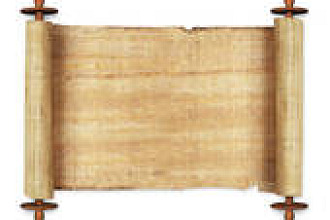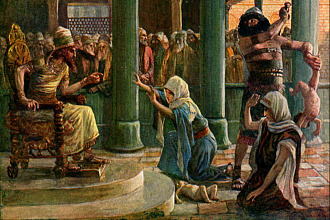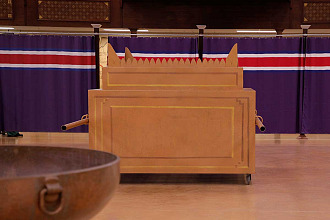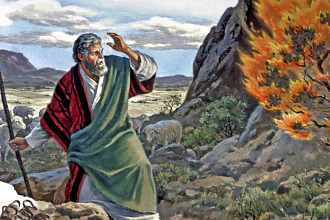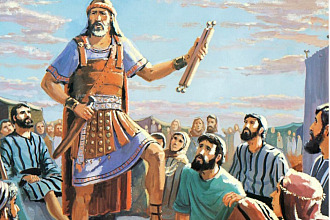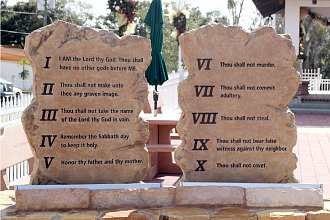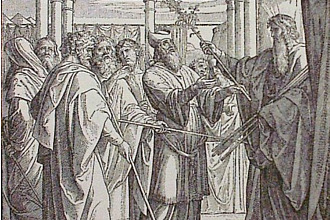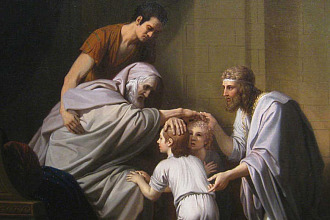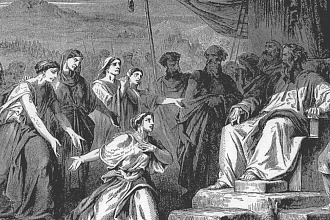Parasha for the Week: Naso: Numbers 4:21 – 7:89
Haftarah: Judges 13:2 - 25
Besorat Yeshua: Mark 4:10 - 20
Overview
The Torah assigns the exact Mishkan-related tasks to be performed by the families of Gershon, Kehat, and Merari, the sons of Levi.
A census reveals that over 8,000 men are ready for such service.
All those ritually impure are to be sent out of the encampments.
If after swearing in court to the contrary, a person wrongfully retains his neighbor's property, he has to pay an additional fifth of the price and bring a guilt offering as atonement.
If the claimant has already passed away without heirs, the payments are made to a kohen.
In certain circumstances, a husband who suspects that his wife had been unfaithful brings her to the Temple. A kohen prepares a drink of water mixed with dust from the Temple floor and a special ink that was used for inscribing Hashem's Name on a piece of parchment.
If she is innocent, the potion does not harm her; rather it brings a blessing of children.
If she is guilty, she suffers a supernatural death.
A nazir is one who vows to dedicate himself to Hashem for a specific period of time. He must abstain from all grape products, grow his hair and avoid contact with corpses. At the end of this period he shaves his head and brings special offerings.
The kohanim are commanded to bless the people. The Mishkan is completed and dedicated on the first day of Nisan in the second year after the Exodus.
The prince of each tribe makes a communal gift to help transport the Mishkan, as well as donating identical individual gifts of gold, silver, animal and meal offerings.
"A Nazir"
The Torah states, "This is the law of the Nazir: on the day his nazirut is complete, he shall bring 'him' to the entrance of the Tent of Meeting." (Numbers 13:6). Ibn Ezra writes, "The term nazir comes from the Hebrew word meaning crown. You should know that almost all people are slaves to the pleasures of the world. The only person who is truly a king and has the royal crown on his head is someone who is free from desires." People who are addicted to pleasures might mistakenly view themselves as fortunate that they have so much pleasure. The truth is that they are enslaved by those pleasures. When they don't have them, they feel the suffering of deprivation. Their thoughts are fixated on what they can do to obtain their desires. They spend more time worrying about how they can obtain pleasures than actually enjoying themselves. Seeking pleasure is an illusory goal. A pleasure-seeker will never be fulfilled.
Happiness is a much more sensible goal than pleasure, and the way to acquire happiness is by being in control of one's desires. When you derive pleasure from self-control, your situation is reversed. You will be free from worrying about obtaining desires and you will constantly experience the pleasure of having victory over the carnal nature!
"Cohanim's Blessing" (Numbers 6:24-26 (TEV)
"May the LORD bless you and take care of you;
May the LORD be kind and gracious to you;
May the LORD look on you with favor and give you peace."
Haftarah: Judges 13:2 - 25
Parasha: We have a description of the Nazir: "The L-RD spoke to Moses, saying: ...When either men or women make... the vow of a nazirite, to separate themselves to the L-RD, they shall separate themselves from wine and strong drink; they shall drink no wine vinegar or other vinegar, and shall not drink any grape juice or eat grapes, fresh or dried. ... All the days of their nazirite vow no razor shall come upon the head; until the time is completed for which they separate themselves to the L-RD, they shall be holy..." (Num. 6:2,3,6).
Haftara: Our Haftara gives us an example of a Nazir, who was chosen by G-d to be a Nazir. It is the story of Samson. The text of the Haftara is about the announcement of his birth. "the Angel of the L-RD appeared to the woman and said to her, "Although you are barren, having borne no children, you shall conceive and bear a son. Now be careful not to drink wine or strong drink, or to eat anything unclean, for you shall conceive and bear a son. No razor is to come on his head, for the boy shall be a nazirite to G-d from birth" (Judges 13:3-5).
This is no mere angel, it is the "Angel (or Messenger) of the LORD. He called out to Abraham when he was about to sacrifice Isaac and said "You have not withheld your son from Me." Gen. 22:12). He also appeared to Abraham before the destruction of Sodom and Gomorrah and in the text He is called in Hebrew "Adonai" (Genesis 18:1-3). He spoke with Jacob and refers to Himself as the God of Bethel (Gen. 31:11-13). He also wrestled with Jacob (Hosea 12:2-4). He is also the one who spoke to Moses from the burning bush (Ex 3:2). He is also referred to as the protector of Israel in the wilderness and had the power to forgive their sins (Exodus 23:20-22). Joshua bowed down and paid Him homage (Joshua5:13-15). He met with Gideon and is called Wonderful (Judges 6:11-21). In the book of Daniel He is called Michael (Daniel 12:1). In Hebrew Mi-Ka-EL means the one "who (Mi) is like (Ka) G-d (EL)" and many theologians have seen in this as the appearance of the Mashiach, the one who protects and saves Israel. "At that time Michael, the great prince, the protector of your people, shall arise... at that time your people shall be delivered, everyone who is found written in the book. Many of those who sleep in the dust of the earth shall awake, some to everlasting life, and some to shame and everlasting contempt. (Dan. 12:1,2)
Besorat Yeshua: Mark 4:10 - 20
Parasha: This text is about nazirites. "The L-RD spoke to Moses, saying: ...When either men or women make a special vow, the vow of a nazirite, to separate themselves to the L-RD..." (Numbers 6:2).
Besorah: There is a parallel between the text of the Haftarah and this passage of the Besorah. In the Besorah, Yeshua, interpreting the parable of the sower, saying that the seed fell in different part of the field and is received in different manner, some believe, some doubt, and some don't believe. In this text we see a parallel with the character of Samson. Even though Samson was chosen by G-d, before he was born he still had to make his own personal choices. Samson knew exactly what the angel said to his mother before he was born, his mother followed all the that the angel said. He knew that he was chosen to lead Israel to victory against the Philistines. But he chose the world and the love of a non-believing woman. Yeshua said: "some seeds are sown among the thorns: these are the ones who hear the word, but the cares of the world, and the lure of wealth, and the desire for other things come in and choke the word, and it yields nothing. " (Mark 4:18-20). This is the story of Samson, he received the seed by his mother, but allowed himself to be surrounded by the thorns. He was attracted by a woman who was a member of the enemy of God's people, and of course when Delilah had to make a choice, she choose her own people. Fortunately after making some horrible choices Samson turned back to the L-ord G-d and was received by Him.


